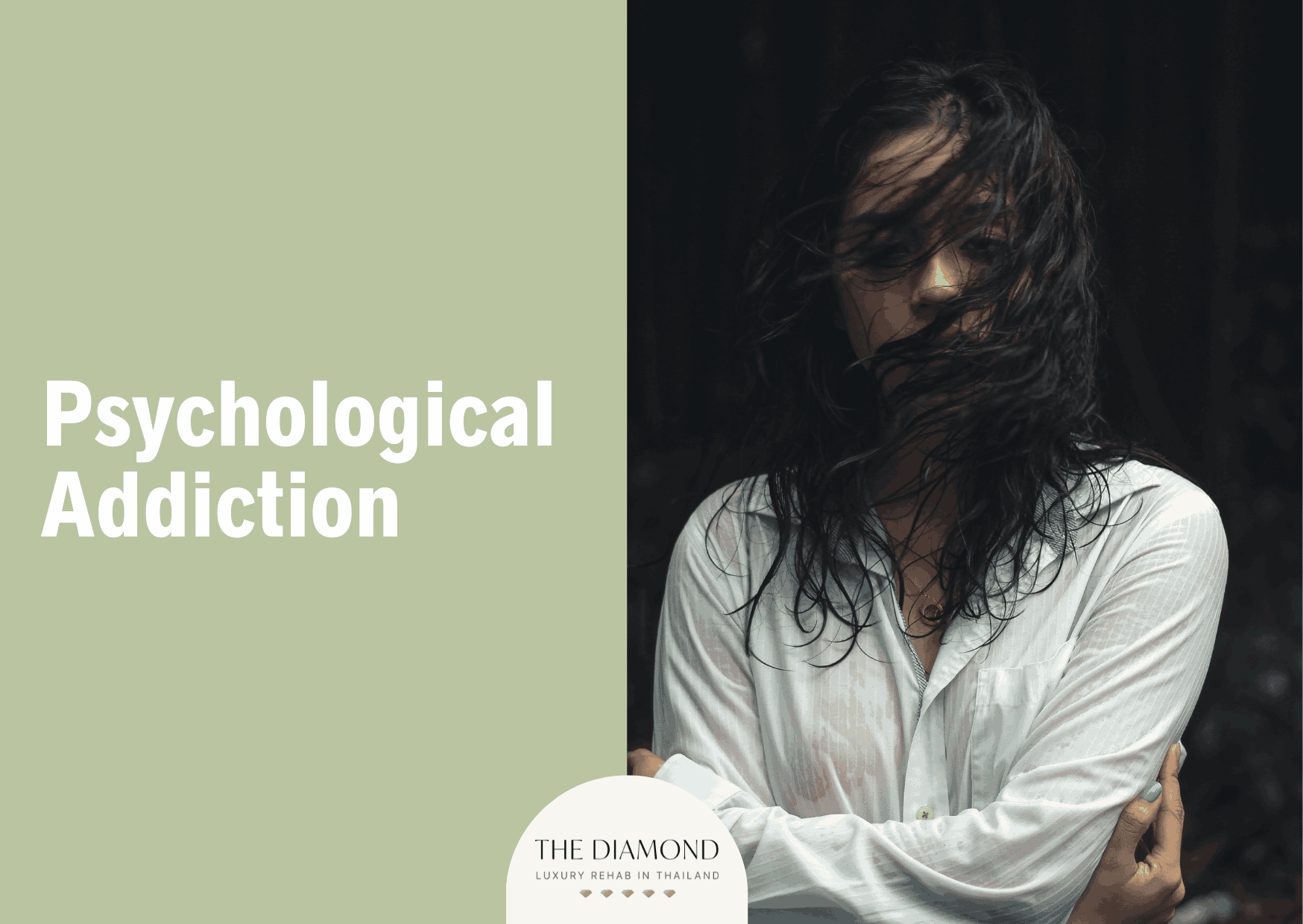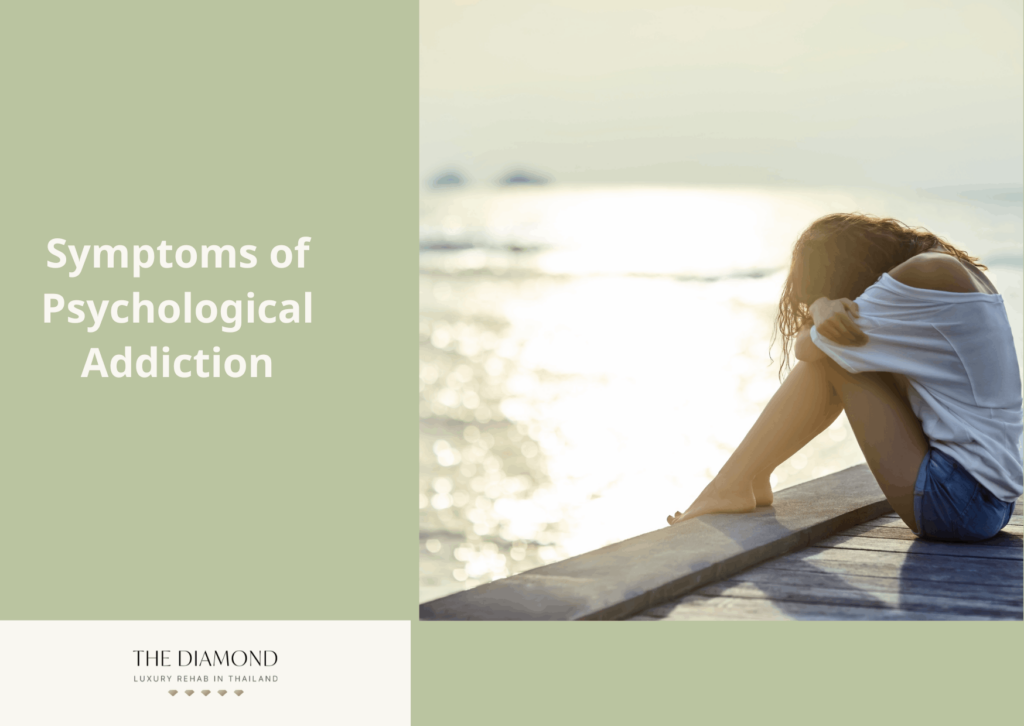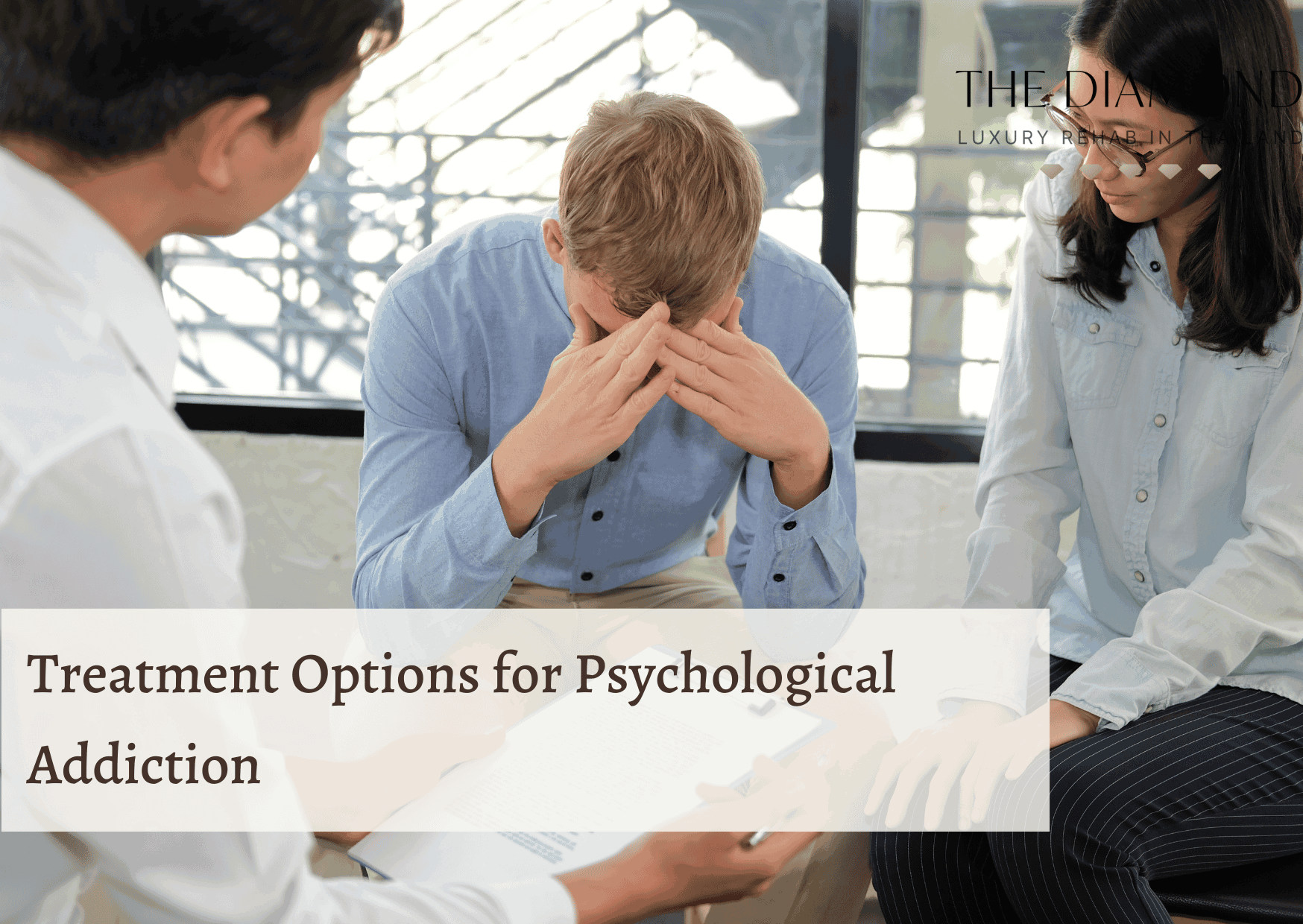Psychological addiction: definition, symptoms, and treatment
Table of content
- What can psychological addiction be against?
- What are the causes of psychological addiction?
- What are the symptoms of psychological addiction?
- What does psychological withdrawal look like?
- What are the treatment options for psychological addiction?
- What is the difference between psychological and physical addiction?

Psychological addiction is defined as the emotional or mental dependence on a specific addictive agent. Also known as emotional or mental addiction, this type of addiction refers to a different aspect of substance use disorder that affects thoughts, emotions, and behaviors.
The main causes of psychological addiction are trauma and underlying mental health problems. Symptoms range from strong cravings to obsession with the drug and social isolation.
The biggest misconception about psychological addiction is that it’s a synonym for physical addiction. While these two can overlap and have some similarities, they’re not the same thing. Psychological addiction manifests itself through changed thinking and behavior patterns. Treatment of addiction should particularly focus on the psychological aspect in order to fully help a person on the road to recovery.
What can psychological addiction be against?
Psychological addiction can be triggered or worsened by any substance. Substances that can cause psychological addiction include alcohol, opioids, inhalants, cannabis, stimulants like cocaine, and hallucinogenic drugs such as LSD.
Psychological addiction can be divided into psychological drug addiction and psychological alcohol addiction. Psychological alcohol addiction is characterized by problematic dependence on alcohol to escape from negative feelings and emotions, cope with mental health problems, or feel good.
Psychological drug addiction refers to using illegal drugs and prescription medications to the point of obsession, involvement in risky behaviors, and exhibiting irritable moods when not consuming drugs.
Psychological theories of addiction depict risky behaviors wherein a person uses drugs or substances to escape from their current situation, especially if negative events characterize it.
What are the causes of psychological addiction?
The causes of psychological addiction include trauma, mental health disorders, peer pressure, and an unhealthy environment.
One of the major causes of psychological addiction is trauma. According to a paper published in the European Journal of Psychotraumatology by Professor Wim Van den Brink of the University of Amsterdam, trauma and addiction commonly co-occur. Multiple hypotheses are argued about the connection between trauma (PTSD) and addiction. A 2020 review article published in the Frontiers in Psychology by Cristina E. María-Ríos and Jonathan D. Morrow of the University of Michigan discussed the link between PTSD and addiction. One arguable factor is the self-medication of addictive substances to attempt to manage PTSD symptoms. Furthermore, trauma and a history of sexual abuse can contribute to developing problematic substance addiction. For instance, a 2014 German study published in the Addictive Behaviors by Ingo Schäfer and colleagues from the University of Hamburg and University Medical Center Hamburg-Eppendorf found that 66% of women and 11% of men with opioid addiction have a history of sexual abuse. The same study also found that among alcohol-dependent patients, 35% of female patients and 6% of male patients were sexually abused as a child.
Other factors associated with psychological addiction include existing mental health disorders such as depression, ADHD, and anxiety. Peer pressure can also result in motivation to use drugs and become psychologically addicted to them. According to a 2022 review paper published in Substance Abuse and Rehabilitation led by research physician Elizabeth Schwartz of Yale University, substance use disorders are highly influenced by environmental factors, with the shared environment being the significant risk from situations when it becomes a learned behavior. This happens in persons with a family history of addiction or individuals who socialize with drug users.
What is the process of psychological addiction?
The psychological addiction process starts when the addictive agent activates the brain’s reward systems. The brain’s biology plays a crucial role in developing psychological addiction. A 2016 paper published in The Lancet Psychiatry by George Koob, director of the National Institute on Alcohol Abuse and Alcoholism, and Nora Volkow, director of the National Institute on Drug Abuse of the National Institutes of Health, explains in detail the neurocircuitry analysis of the neurobiology of addiction. Once the brain’s reward systems are activated, which are responsible for the feelings of pleasure, the brain releases certain chemicals, such as dopamine and opioid peptides. In the case of substance abuse, circuits in the brain responsible for drug reward interact with other circuits that regulate mood, stress, memory, and decision-making and cause imbalances that make a person feel strong, which drives the motivation to take the drug. This enhances the brain’s learning process that associates the drug with positive outcomes and thus yielding automatic behaviors.
Prolonged substance use develop neuroadaptations in the brain that results in changes in receptor levels, neurotransmitter releases, and signaling neural pathways that manifest in a declined response to the normal doses of the drug. This induces a phenomenon called tolerance, where the brain requires consuming higher doses to achieve the same effects. As a result, the person wants to recreate the same pleasurable feelings by using the specific substance again and in higher doses, ultimately falling into a vicious cycle that leads to psychological addiction.
Pleasure and satisfaction do not necessarily lead to addiction. Factors contributing to developing psychological addiction vary and are mostly influenced by the aforementioned causes. The psychology of addictive behaviors is a complex field and shows the true severity of these problems.
What are the symptoms of psychological addiction?

The symptoms of psychological addiction vary across individuals and are listed below:
- Cravings: a strong desire and unwanted to use an addictive agent. This overwhelming emotional experience can lead to mood swings, irritability, depression, anger, and behaviors that disappear upon substance consumption. Cravings intensify and worsen addiction and its consequences.
- Loss of interest: psychological dependence manifests through a lack of interest in activities that an individual once enjoyed and becomes preoccupied with drugs or substances. Lack of interest may lead to isolation and aggravate addiction.
- Obsession with drugs or substances: dependence or obsession with certain drugs or substances in order to properly function in different areas of life, such as sleep, work, and personal management. Symptoms of obsession may also manifest in devoting a significant amount of time dwelling on drug use, acquiring the drug, and planning life around drug consumption and use.
- Denial: one of the most notable symptoms of psychological addiction is denial, where an individual refuses to acknowledge the problem and becomes irritable when confronted about the problem. Denial pushes an addicted individual further into the dangers of addiction, as denial may lead to refusal to get professional help and address the addiction.
- Cognitive problems: addiction to a drug or substance can cause problems with memory, focus and concentration, problem-solving skills, and judgment. An individual may consume drugs or substances in order to relieve these problems, and the vicious cycle of addiction continues.
What is the difference between psychological addiction and psychological dependence?
The difference between psychological addiction and psychological dependence is in the severity of substance or drug use. Dependence and addiction often coexist in people struggling with substance use disorder.
Psychological addiction is a disorder characterized by the compulsive urge to use substances despite their consequences and the lack of control over substance use despite repeated attempts to stop or reduce consumption. On the other hand, psychological dependence refers to the emotional and mental aspects of substance use disorder. It is associated with reliance on substances or drugs in order to function normally and to relieve stress and mental health issues. Dependence can contribute to developing tolerance and experiencing withdrawal symptoms.
Dependence often leads to addiction and is considered dangerous. Addiction is the most severe form of substance abuse.
What does psychological withdrawal look like?
Psychological withdrawal is the emotional and mental response of the body upon discontinuation of drug or substance intake. It manifests as intense fear and panic when an addictive agent is not consumed.
Individuals suffering from addiction exhibit psychological withdrawal symptoms of anxiety, depression, decreased motivation, apathy, and difficulty experiencing pleasure. Some patients may experience serious symptoms such as hallucinations and delusions.
Risks that influence the severity of the psychological withdrawal symptoms include the level of addiction or dependency, duration of use, type of addictive agent, and amount of drug consumed.
Treatment for psychological withdrawal may include a combination of therapy and medications. In some cases, medications are necessary to address underlying mental health problems.
What are the treatment options for psychological addiction?

Treatment options for psychological addiction include a patient-centric approach where it focuses on the specific needs of each patient. While treatment of physical addiction is straightforward and includes detoxification and other approaches, managing psychological dependence is more complex. Psychological addiction may be addressed during the treatment process of physical addiction; however, in most cases, that is not enough. Detox alone does not address the underlying reasons and motivations behind substance abuse.
Psychological addiction treatment requires rehab and therapy or medications to treat underlying mental health problems. Rehab centers serve to provide support and treatment to remove the drug from the system and help recover from both the physical and psychological consequences of addiction. Through individual and group counseling sessions, rehabs enable patients to adopt healthier coping mechanisms to manage triggers that propel substance abuse.
Rehabs offer inpatient and outpatient treatment approaches. Inpatient treatments are necessary in order to learn how to handle temptations and avoid relapse. During inpatient treatments which may last up to 90 days, patients receive education on what psychological addiction is, therapy and get relapse prevention plans, as well as coping techniques crucial for a sober life.
Outpatient treatment is suitable for persons whose addiction is not severe and individuals who completed inpatient treatment and need support to stay clean. These also include regular counseling sessions as well as support groups.
Therapy is an integral component of psychological addiction treatment. The goal of therapy depends on the specific type employed. For example, cognitive-behavioral therapy (CBT) helps patients identify negative thoughts and behavioral patterns that encourage or contribute to addiction. During regular therapy sessions, the patient works on replacing negative patterns with more positive alternatives. Besides CBT, other therapy approaches in treating psychological addiction may include motivational interviewing and contingency management.
Motivational interviewing revolves around structured conversations that enable patients to elevate their motivation to overcome substance abuse. Contingency management involves incentives that encourage patients to stay off drug use, according to the American Psychological Association.
A 2021 review paper published in Psychological Medicine by researchers from different universities in the UK confirmed that CBT helps improve the quality of life of people suffering from different mental and physical health problems, including addiction. The length of psychological addiction treatment depends on several factors, such as the addictive agent, severity of addiction, whether a patient has other addictions, and underlying mental health problems. Most patients need to spend at least three months in treatment. A longer duration of treatment yields the best outcomes.
Can psychological addiction be treated in rehabs?
Psychological addiction can be treated in rehab. The main objective of rehab centers is to provide a safe and non-judgmental environment where persons with addiction can adopt coping skills and other mechanisms essential for recovery.
Rehabilitation is defined as a set of interventions necessary when a person is experiencing limitations in everyday functioning, in this case, when someone struggles with addiction. Rehab centers provide both treatment and support, especially for individuals with psychological dependence withdrawal symptoms. The actual treatment course may depend on the type of addiction or the addictive agent.
Since psychological addiction is deeply connected to a person’s mental health, rehab is an effective approach. Addictions tend to co-occur with a wide range of mental health diseases. Psychological addiction isn’t an exception.
The core treatment of rehab centers is therapy sessions wher individuals with psychological addiction work on improving their mental health and are provided support during recovery.
What is the difference between psychological and physical addiction?
The difference between psychological and physical addiction is that physical addiction occurs when an individual becomes dependent on a substance to function normally and experiences withdrawal upon cessation. In contrast, psychological addiction is the emotional and mental attachment and compulsion or perceived need to use a substance to experience relief and pleasure.
The main difference between physical and psychological addiction is how the body perceives and reacts to addictive substances. Physical addiction induces biological and chemical dependence on the addictive agent. Conversely, psychological addiction is more involved in the addictive process affecting behavior.
Physical dependency is caused by the chemical level changes in the brain. Drugs or substances alter brain chemistry and lead to various symptoms such as anger, depression, lack of sleep, gastrointestinal issues, seizures, and trembling. Meanwhile, psychological dependence is associated with obsession, risky behaviors, and continuing to use the drug or substance despite the problems it causes.
Both physical and psychological addiction lead to an individual’s reliance on certain substances to avoid withdrawal symptoms and experience pleasurable effects. Both require medical and professional intervention when the addiction impacts important aspects of life.

